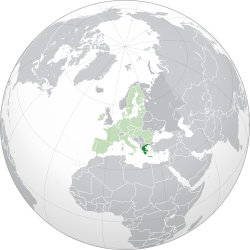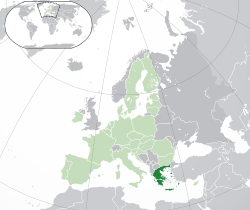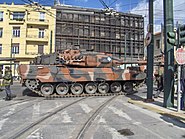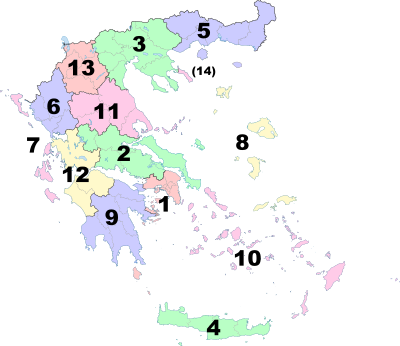
A | B | C | D | E | F | G | H | CH | I | J | K | L | M | N | O | P | Q | R | S | T | U | V | W | X | Y | Z | 0 | 1 | 2 | 3 | 4 | 5 | 6 | 7 | 8 | 9
Hellenic Republic | |
|---|---|
| Motto: Ελευθερία ή Θάνατος Elefthería í Thánatos (English: "Freedom or Death") | |
| Anthem: Ύμνος εις την Ελευθερίαν Ímnos is tin Eleftherían (English: "Hymn to Liberty") | |
Location of Greece (dark green) – in Europe (light green & dark grey) | |
| Capital and largest city | Athens 37°58′N 23°43′E / 37.967°N 23.717°E |
| Official language and national language | Greek |
| Religion (2017) |
|
| Demonym(s) |
|
| Government | Unitary parliamentary republic |
| Katerina Sakellaropoulou | |
| Kyriakos Mitsotakis | |
| Konstantinos Tasoulas | |
| Legislature | Hellenic Parliament |
| Establishment history | |
• Independence declared from the Ottoman Empire | 25 March 1821 (traditional starting date of the Greek War of Independence), 15 January 1822 (official declaration) |
| 3 February 1830 | |
| 24 July 1974 | |
| 11 June 1975 | |
| Area | |
• Total | 131,957 km2 (50,949 sq mi)[2] (95th) |
• Water (%) | 1.51 (2015)[3] |
| Population | |
• 2023 estimate | |
• 2021 census | |
• Density | 78.9/km2 (204.4/sq mi) (105th) |
| GDP (PPP) | 2024 estimate |
• Total | |
• Per capita | |
| GDP (nominal) | 2024 estimate |
• Total | |
• Per capita | |
| Gini (2023) | medium |
| HDI (2022) | very high (33rd) |
| Currency | Euro (€) (EUR) |
| Time zone | UTC+02:00 (EET) |
• Summer (DST) | UTC+03:00 (EEST) |
| Date format | dd.mm.yyyy (AD)b |
| Driving side | right |
| Calling code | +30 |
| ISO 3166 code | GR |
| Internet TLD | |
| |
Greece,[a] officially the Hellenic Republic,[b] is a country in Southeast Europe. Located on the southern tip of the Balkan peninsula, Greece shares land borders with Albania to the northwest, North Macedonia and Bulgaria to the north, and Turkey to the east. The Aegean Sea lies to the east of the mainland, the Ionian Sea to the west, and the Sea of Crete and the Mediterranean Sea to the south. Greece has the longest coastline on the Mediterranean Basin, featuring thousands of islands. The country comprises nine traditional geographic regions, and has a population of nearly 10.4 million.[4] Athens is the nation's capital and largest city, followed by Thessaloniki and Patras.
Greece is considered the cradle of Western civilization, being the birthplace of democracy, Western philosophy, Western literature, historiography, political science, major scientific and mathematical principles, theatre, and the Olympic Games. From the eighth century BC, the Greeks were organised into various independent city-states known as poleis (singular polis) that spanned the Mediterranean and Black seas. Philip II of Macedon united most of present-day Greece in the fourth century BC, with his son Alexander the Great rapidly conquering much of the known ancient world from the eastern Mediterranean to northwestern India. The subsequent Hellenistic period saw the height of Greek culture and influence in antiquity. Greece was annexed by Rome in the second century BC, becoming an integral part of the Roman Empire and its continuation, the Byzantine Empire, which was predominately Greek in culture and language. The Greek Orthodox Church, which emerged in the first century AD, helped shape modern Greek identity and transmitted Greek traditions to the wider Orthodox world. After the Fourth Crusade in 1204, Latin possessions were established in parts of the Greek peninsula, but most of the area fell under Ottoman rule by the mid-15th century.
Following a protracted war of independence, which started in 1821, Greece emerged as a modern nation state in 1830. Over the first hundred years, the Kingdom of Greece sought territorial expansion, which was mainly realized in the early 20th century during the Balkan Wars and up until the catastrophic defeat of its Asia Minor Campaign in 1922. The short-lived republic that was established in 1924 was beset by the ramifications of civil strife and the challenge of resettling refugees from Turkey. In 1936 a royalist dictatorship inaugurated a long period of authoritarian rule, marked by military occupation, civil war and military dictatorship. Democracy was restored in 1974–5, leading to the current parliamentary republic.
Greece is a democratic and, having achieved record economic growth from 1950 through the 1970s, a developed country with an advanced high-income economy, the second largest in the Balkans ranked 54th by nominal GDP, where it is an important regional investor. A founding member of the United Nations, Greece was the tenth member to join what is today European Union and has been part of the eurozone since 2001. It is also a member of numerous other international institutions, including the Council of Europe, NATO, the OECD, the WTO, and the OSCE. Greece has a unique cultural heritage, large tourism industry, and prominent shipping sector. The country's rich historical legacy is reflected in part by its 19 UNESCO World Heritage Sites. Greece was the ninth most-visited country in the world in 2022 .[11]
Name
The native name of the country in Modern Greek is Ελλάδα (ⓘ, pronounced [eˈlaða]). The corresponding form in Ancient Greek and conservative formal Modern Greek (Katharevousa) is Ἑλλάς (Hellas, classical: [hel.lás], modern: [eˈlas]). This is the source of the English alternative name Hellas, which is mostly found in archaic or poetic contexts today. The Greek adjectival form ελληνικός (ellinikos, [eliniˈkos]) is sometimes also translated as Hellenic and is often rendered in this way in the formal names of Greek institutions, as in the official name of the Greek state, the Hellenic Republic (Ελληνική Δημοκρατία, [eliniˈci ðimokraˈti.a]).[12]
The English names Greece and Greek are derived, via the Latin Graecia and Graecus, from the name of the Graeci (Γραικοί, Graikoí; singular Γραικός, Graikós), one of first ancient Greek tribes to settle Magna Graecia in southern Italy.
History
Prehistory and Aegean civilizations
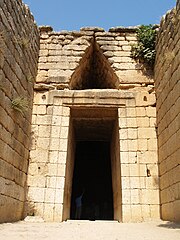
The Apidima Cave in Mani, in southern Greece, has been suggested to contain the oldest remains of early modern humans outside of Africa, dated to 200,000 years ago.[13] However others suggest the remains represent archaic humans.[14] All three stages of the Stone Age are represented in Greece, for example in the Franchthi Cave.[15] Neolithic settlements in Greece, dating from the 7th millennium BC,[16] are the oldest in Europe, as Greece lies on the route by which farming spread from the Near East to Europe.[17]
Greece is home to the first advanced civilizations in Europe and considered the birthplace of Western civilisation,[18][19] beginning with the Cycladic culture on the islands of the Aegean Sea around 3200 BC,[20] the Minoan civilization in Crete (2700–1500 BC),[21][22] and then the Mycenaean civilization on the mainland (1600–1100 BC).[22] These civilizations possessed writing, the Minoans using an undeciphered script known as Linear A, and the Mycenaeans writing the earliest attested form of Greek in Linear B.[23] Contemporary Hittite and Egyptian records suggest the presence of a single state under a "Great King" based in mainland Greece.[24][25]
Ancient Greece
The collapse of the Mycenean civilization ushered in the Greek Dark Ages, from which written records are absent. The end of the Dark Ages is traditionally dated to 776 BC, the year of the first Olympic Games.[26] The Iliad and the Odyssey, the foundational texts of Western literature, are believed to have been composed by Homer in the 7th or 8th centuries BC.[27][28] Poetry shaped beliefs to the Olympian gods, but ancient Greek religion had no priestly class or systematic dogmas and encompassed other currents, such as popular cults, like that of Dionysus, mysteries and magic.[29] At this time there emerged kingdoms and city-states across the Greek peninsula, which spread to the shores of the Black Sea, Magna Graecia in southern Italy and Asia Minor. These reached great prosperity that resulted in an unprecedented cultural boom, that of classical Greece, expressed in architecture, drama, science, mathematics and philosophy. In 508 BC, Cleisthenes instituted the world's first democratic system of government in Athens.[30][31]

By 500 BC, the Persian Empire controlled the Greek city states in Asia Minor and Macedonia.[32] Attempts by Greek city-states of Asia Minor to overthrow Persian rule failed, and Persia invaded the states of mainland Greece in 492 BC, but was forced to withdraw after defeat at the Battle of Marathon in 490 BC. In response, the Greek city-states formed the Hellenic League in 481 BC, led by Sparta, which was the first recorded union of Greek states since the mythical union of the Trojan War.[33][34] The second Persian invasion of Greece was decisively defeated in 480-79 BC, at Salamis and Plataea, marking the eventual withdrawal of the Persians from all their European territories. The Greek victories in the Greco-Persian Wars are a pivotal moment in history,[35] as the 50 years of peace afterwards are known as the Golden Age of Athens, a seminal period that laid many foundations of Western civilization. Lack of political unity resulted in frequent conflict between Greek states. The most devastating intra-Greek war was the Peloponnesian War (431–404 BC), which marked the demise of the Athenian Empire and the emergence of Spartan and later Theban hegemony.[36] Weakened by constant wars among them during the 4th century BC, the Greek poleis were subjugated to the rising power of the kingdom of Macedon under king Philip II into an alliance known as the Hellenic League.[37]
After Philip's assassination in 336 BC, his son and king of Macedon, Alexander, set himself leader of a Panhellenic campaign against the Persian Empire and abolished it. Undefeated in battle, he marched, until his untimely death in 323 BC, to the banks of the Indus.[38] Alexander's empire fragmented, inaugurating the Hellenistic period. After fierce conflict amongst themselves, the generals that succeeded Alexander and their successors founded large personal kingdoms in the areas he had conquered, such as that of the Ptolemies in Egypt and of the Seleucids in Syria, Mesopotamia and Iran.[39] As a result of the settlement of Greeks in newly founded poleis of these kingdoms, such as Alexandria and Antioch, as members of a ruling minority, during the centuries that followed a vernacular form of Greek, known as koine, and Greek culture was spread, while the Greeks adopted Eastern deities and cults.[40] Greek science, technology, and mathematics reached their peak during the Hellenistic period.[41] Aspiring to maintain their autonomy and independence from the Antigonid kings of the Macedonians, many poleis of Greece united in koina or sympoliteiai i.e. federations, while after the establishment of economic relations with the East, a stratum of wealthy euergetai dominated their internal life.[42]
Roman province (146 BC – 4th century AD)

From about 200 BC the Roman Republic became increasingly involved in Greek affairs and engaged in a series of wars with Macedon.[43] Macedon's defeat at the Battle of Pydna in 168 BC signalled the end of Antigonid power.[44] In 146 BC, Macedonia was annexed as a province by Rome, and the rest of Greece became a Roman protectorate.[43][45]
The process was completed in 27 BC when emperor Augustus annexed the rest of Greece and constituted it as the senatorial province of Achaea.[45] Despite their military superiority, the Romans admired and became heavily influenced by Greek culture, hence Horace's famous statement: "Greece, although captured, took its wild conqueror captive".[46] The epics of Homer inspired the Aeneid of Virgil, and authors such as Seneca the Younger wrote using Greek styles. Roman heroes such as Scipio Africanus, studied philosophy and regarded Greek culture and science as an example to be followed. Similarly, most Roman emperors admired things Greek in nature. Emperor Nero visited Greece in AD 66, and performed at the Ancient Olympic Games, while Hadrian[47] served as an eponymous archon of Athens, before becoming emperor.[48]
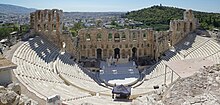
Greek-speaking communities of the Hellenised East were instrumental in the spread of Christianity in the 2nd and 3rd centuries,[49] and Christianity's early leaders and writers were mostly Greek-speaking, though not from Greece itself.[50] The New Testament was written in Greek, and some sections attest to the importance of churches in Greece in early Christianity. Nevertheless, much of Greece clung to paganism, and ancient Greek religious practices were still in vogue in the late 4th century AD,[51] when they were outlawed by the Roman emperor Theodosius I in 391–392.[52] The last recorded Olympic games were held in 393,[53] and many temples were destroyed or damaged in the century that followed.[54][55] The closure of the Neoplatonic Academy of Athens by Emperor Justinian in 529 is considered the end of antiquity, although there is evidence that the academy continued.[54][56]
Medieval period (4th–15th century)

The Roman Empire in the east, following the fall of the Western Roman Empire in the 5th century, is known as the Byzantine Empire (but called "Kingdom of the Romans" in its own time) and lasted until 1453. With its capital in Constantinople, its language and culture were Greek and its religion was predominantly Eastern Orthodox Christian.[57]
The Empire's Balkan territories, including Greece, suffered from the dislocation of barbarian invasions;[58] raids by Goths and Huns in the 4th and 5th centuries and the Slavic invasion in the 7th century resulted in a collapse in imperial authority in the Greek peninsula.[59] The imperial government retained control of only the islands and coastal areas, particularly the populated walled cities such as Athens, Corinth and Thessalonica.[59] [60][61] However, the view that Greece underwent decline, fragmentation and depopulation is considered outdated, as cities show institutional continuity and prosperity between the 4th and 6th centuries. In the early 6th century, Greece had approximately 80 cities according to the Synecdemus chronicle, and the 4th to the 7th century is considered one of high prosperity.[62]

Until the 8th century almost all of modern Greece was under the jurisdiction of the Holy See of Rome. Byzantine Emperor Leo III moved the border of the Patriarchate of Constantinople westward and northward in the 8th century.[63] The Byzantine recovery of lost provinces during the Arab–Byzantine wars began in the 8th century and most of the Greek peninsula came under imperial control again.[64][65] This process was facilitated by a large influx of Greeks from Sicily and Asia Minor to the Greek peninsula, while many Slavs were captured and re-settled in Asia Minor.[60] During the 11th and 12th centuries the return of stability resulted in the Greek peninsula benefiting from economic growth.[64] The Greek Orthodox Church was instrumental in the spread of Greek ideas to the wider Orthodox world.[66][full citation needed]
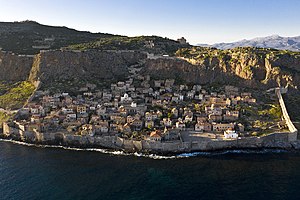
Following the Fourth Crusade and fall of Constantinople to the "Latins" in 1204, mainland Greece was split between the Greek Despotate of Epirus and French rule[67] (the Frankokratia).[68] The re-establishment of the imperial capital in Constantinople in 1261 was accompanied by the empire's recovery of much of the Greek peninsula, while the islands remained under Genoese and Venetian control.[67] During the Paleologi dynasty (1261–1453) a new era of Greek patriotism emerged accompanied by a turning back to ancient Greece.[69][70][71][72][73]
In the 14th century much of the Greek peninsula was lost by the Byzantine Empire to the Serbs and then the Ottomans.[74] Constantinople fell to the Ottomans in 1453 and by 1460, Ottoman conquest of mainland Greece was complete.[75] Byzantine Greek scholars, who up until then were largely responsible for preserving Classical Greek knowledge, fled to the West, taking with them literature and significantly contributing to the Renaissance.[76]
Venetian possessions and Ottoman rule (15th century – 1821)

While most of mainland Greece and the Aegean islands was under Ottoman control by the end of the 15th century, Cyprus and Crete remained Venetian and did not fall to the Ottomans until 1571 and 1670 respectively.[78] While some Greeks in the Ionian Islands and Constantinople lived in prosperity, and Greeks of Constantinople (Phanariots) achieved power within the Ottoman administration,[79] much of Greece suffered the economic consequences of Ottoman conquest. Heavy taxes were enforced, and in later years the Ottoman Empire enacted a policy of creation of hereditary estates, effectively turning the rural Greek populations into serfs.[80]
The Greek Orthodox Church and the Ecumenical Patriarchate of Constantinople were considered by the Ottoman governments as the ruling authorities of the entire Orthodox Christian population of the Ottoman Empire, whether ethnically Greek or not. Although the Ottoman state did not force non-Muslims to convert to Islam, Christians faced discrimination intended to highlight their inferior status. Discrimination, particularly when combined with harsh treatment by local Ottoman authorities, led to conversions to Islam, if only superficially. In the 19th century, many "crypto-Christians" returned to their old religious allegiance.[81]

The nature of Ottoman administration of Greece varied, though it was invariably arbitrary and often harsh.[81] Some cities had governors appointed by the Sultan, while others, like Athens, were self-governed municipalities. Mountainous regions in the interior and many islands remained effectively autonomous from the central Ottoman state for centuries.[82][page needed] Prior to the Greek Revolution of 1821, there had been wars which saw Greeks fight against the Ottomans, such as the Greek participation in the Battle of Lepanto in 1571, the Morean War of 1684–1699, and the Russian-instigated Orlov Revolt in 1770.[82][page needed] These uprisings were put down by the Ottomans with great bloodshed.[83][84] Many Greeks were conscripted as Ottoman citizens to serve in the Ottoman army and especially the navy, while the Ecumenical Patriarchate of Constantinople, responsible for the Orthodox, remained in general loyal to the Empire.
The 16th and 17th centuries are regarded as a "dark age" in Greek history, with the prospect of overthrowing Ottoman rule appearing remote, with only the Ionian islands remaining free. However, in the 18th century, due to mastery of shipping and commerce, a wealthy and dispersed Greek merchant class arose. These merchants came to dominate trade within the Ottoman Empire, establishing communities throughout the Mediterranean, the Balkans, and Western Europe. Though the Ottoman conquest had cut Greece off from significant European intellectual movements such as the Reformation and the Enlightenment, these ideas together with the ideals of the French Revolution and romantic nationalism began to penetrate the Greek world via the mercantile diaspora.[85] In the late 18th century, Rigas Feraios, the first revolutionary to envision an independent Greek state, published documents on Greek independence, in Vienna.[86][87]
Modern nation-state
Greek War of Independence (1821–1832)

In the 18th century, an increase in learning during the Modern Greek Enlightenment led to the emergence among Westernized Greek-speaking elites of the notion of a Greek nation. A secret organization formed in this milieu was the Filiki Eteria, in 1814.[88] They engaged traditional strata of the Greek Orthodox world in their liberal nationalist cause.[89]
The first revolt began on 6 March 1821 in the Danubian Principalities, but was put down by the Ottomans. This spurred the Greeks of the Peloponnese and on 17 March the Maniots declared war on the Ottomans.[90] By October 1821 the Greeks had captured Tripolitsa. There were revolts in Crete, Macedonia and Central Greece, which were suppressed. In 1822 and 1824 the Turks and Egyptians ravaged the islands, committing massacres.[90][91][92] This galvanized opinion in western Europe in favour of the Greeks.[93] The Ottoman Sultan Mahmud II negotiated with Mehmet Ali of Egypt, who agreed to send his son Ibrahim Pasha with an army, in return for territorial gain.[94] By the end of 1825, most of the Peloponnese was under Egyptian control.[95] Three great powers, France, Russian Empire, and the UK, each sent a navy.[96] The allied fleet destroyed the Ottoman–Egyptian fleet at the Battle of Navarino, and the Greeks captured Central Greece by 1828. The nascent Greek state was recognised under the London Protocol in 1830.[97]
Kingdom of Greece

In 1827, Ioannis Kapodistrias, was chosen by the Third National Assembly at Troezen as the first governor of the First Hellenic Republic. Kapodistrias established state, economic and military institutions. Tensions appeared between him and local interests and, following his assassination in 1831 and the London Conference of 1832, Britain, France and Russia installed Bavarian Prince Otto von Wittelsbach as monarch.[98] Otto's reign was despotic, and in its first 11 years of independence Greece was ruled by a Bavarian oligarchy led by Josef Ludwig von Armansperg and, later, by Otto himself, as King and Premier.[98] Greece remained under the influence of its three protecting great powers.[99] In 1843 an uprising forced Otto to grant a constitution and representative assembly.
Despite the absolutism of Otto's reign, it proved instrumental in developing institutions which are still the bedrock of Greek administration and education.[100] Reforms were taken in education, maritime and postal communications, effective civil administration and the legal code.[101] Historical revisionism took the form of de-Byzantinification and de-Ottomanisation, in favour of promoting Ancient Greek heritage.[102] The capital was moved from Nafplio, where it had been since 1829, to Athens, then a smaller town.[103] The Church of Greece was established as Greece's national church and 25 March, the day of Annunciation, was chosen as the anniversary of the Greek War of Independence to reinforce the link between Greek identity and Orthodoxy.[102] Pavlos Karolidis called the Bavarian efforts to create a modern state in Greece as "not only appropriate for the peoples' needs, but also based on excellent administrative principles of the era".[101]
Otto was deposed in 1862 because of the Bavarian-dominated government, heavy taxation, and a failed attempt to annex Crete from the Ottomans.[98][100] He was replaced by Prince Wilhelm of Denmark, who took the name George I and brought with him the Ionian Islands as a coronation gift from Britain. A new Constitution in 1864 changed Greece's form of government from constitutional monarchy to the more democratic crowned republic.[104][105][106] In 1875 parliamentary majority as a requirement for government was introduced,[107] curbing the power of the monarchy to appoint minority governments. Corruption, coupled with increased spending to fund infrastructure like the Corinth Canal,[108] overtaxed the weak economy and forced the declaration of public insolvency in 1893.

Greeks were united, however, in their determination to liberate the Hellenic lands under Ottoman rule; the Cretan Revolt (1866–1869) had raised nationalist fervour. When war broke out between Russia and the Ottomans in 1877, Greek sentiment rallied to Russia, but Greece was too poor and concerned about British intervention, to enter the war.[109] Greeks in Crete continued to stage revolts, and in 1897, the Greek government, bowing to popular pressure, declared war on the Ottomans. In the ensuing Greco-Turkish War of 1897, the badly trained and equipped Greek army was defeated. Through the intervention of the Great Powers, however, Greece lost little territory, while Crete was established as an autonomous state under Prince George of Greece. With state coffers empty, fiscal policy came under International Financial Control.[110] The government, aiming to quell Komitadjis and detach the Slavophone peasants of the region from Bulgarian influence, sponsored a guerrilla campaign in Ottoman-ruled Macedonia, known as the Macedonian Struggle, which ended with the Young Turk Revolution in 1908.[111]
Expansion, disaster, and reconstruction
Amidst dissatisfaction with the seeming inertia and unattainability of national aspirations, military officers organised a coup in 1909 and called on Cretan politician Eleftherios Venizelos, who conveyed a vision of national regeneration. After winning two elections and becoming prime minister in 1910,[112] Venizelos initiated fiscal, social, and constitutional reforms, reorganised the military, made Greece a member of the Balkan League, and led it through the Balkan Wars. By 1913, Greece's territory and population had doubled, annexing Crete, Epirus, and Macedonia. The struggle between King Constantine I and charismatic Venizelos over foreign policy on the eve of First World War dominated politics and divided the country into two opposing groups. During parts of the war, Greece had two governments: A royalist pro-German one in Athens and a Venizelist pro-Entente one in Thessaloniki. They united in 1917, when Greece entered the war on the side of the Entente.

After the war, Greece attempted expansion into Asia Minor, a region with a large native Greek population, but was defeated in the Greco-Turkish War (1919–1922), contributing to a flight of Asia Minor Greeks.[113][114] These events overlapped, happening during the Greek genocide (1914–22),[115][116][117][118][119] when Ottoman and Turkish officials contributed to the death of several hundred thousand Asia Minor Greeks, along with similar numbers of Assyrians and a larger number of Armenians. The resultant Greek exodus from Asia Minor was made permanent, and expanded, in an official population exchange between Greece and Turkey, as part of the Treaty of Lausanne which ended the war.[120] The following era was marked by instability, as over 1.5 million propertyless Greek refugees from Turkey had to be integrated into Greek society. Some refugees could not speak the language and were from unfamiliar environments to mainland Greeks. The refugees made a dramatic population boost, as they were more than a quarter of Greece's prior population.[121]
Following the catastrophic events in Asia Minor, the monarchy was abolished via a referendum in 1924 and the Second Hellenic Republic declared.[122] In 1935, a royalist general-turned-politician Georgios Kondylis took power after a coup and abolished the republic, holding a rigged referendum, after which King George II was restored to the throne.
Dictatorship, World War II, and reconstruction
An agreement between Prime Minister Ioannis Metaxas and George II followed in 1936, which installed Metaxas as head of a dictatorship known as the 4th of August Regime, inaugurating authoritarian rule that would last until 1974.[123] Although a dictatorship, Greece remained on good terms with Britain and was not allied with the Axis.
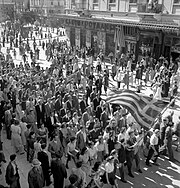
In October 1940, Fascist Italy demanded the surrender of Greece, but it refused, and, in the Greco-Italian War, Greece repelled Italian forces into Albania.[124][citation not found] French general Charles de Gaulle praised the fierceness of the Greek resistance, but the country would fall to urgently dispatched German forces during the Battle of Greece. The Nazis proceeded to administer Athens and Thessaloniki, while other regions were given to Fascist Italy and Bulgaria. Over 100,000 civilians died of starvation during the winter of 1941–42, tens of thousands more died because of reprisals by Nazis and collaborators, the economy was ruined, and most Greek Jews (tens of thousands) were deported and murdered in Nazi concentration camps.[125][126] The Greek Resistance, one of the most effective resistance movements, fought vehemently against the Nazis. The German occupiers committed atrocities, mass executions, and wholesale slaughter of civilians and destruction of towns and villages in reprisals. Hundreds of villages were systematically torched and almost 1 million Greeks left homeless.[126] The Germans executed around 21,000 Greeks, the Bulgarians 40,000, and the Italians 9,000.[127]
Following liberation, Greece annexed the Dodecanese Islands from Italy and regained Western Thrace from Bulgaria. The country descended into a bloody civil war between communist forces and the anti-communist Greek government, which lasted until 1949, with the latter's victory. The conflict, one of the earliest struggles of the Cold War,[128] resulted in further economic devastation, population displacement and political polarisation for the next thirty years.[129]
Although post-war was characterised by social strife and marginalisation of the left, Greece experienced rapid economic growth and recovery, propelled in part by the U.S. Marshall Plan.[130] In 1952, Greece joined NATO, reinforcing its membership in the Western Bloc of the Cold War.[131]
King Constantine II's dismissal of George Papandreou's centrist government in 1965 prompted political turbulence, which culminated in a coup in 1967 by the Greek junta, led by Georgios Papadopoulos. Civil rights were suspended, political repression intensified, and human rights abuses, including torture, were rampant. Economic growth remained rapid before plateauing in 1972. The brutal suppression of the Athens Polytechnic uprising in 1973 set in motion the fall of the regime, resulting in a counter-coup that established brigadier Dimitrios Ioannidis as the new junta strongman. On 20 July 1974, Turkey invaded the island of Cyprus in response to a Greek-backed Cypriot coup, triggering a crisis in Greece that led to the regime's collapse and restoration of democracy through Metapolitefsi.[132]
Third Hellenic Republic

The former prime minister Konstantinos Karamanlis was invited back from self-exile and the first multiparty elections since 1964 were held on the first anniversary of the Polytechnic uprising. A democratic and republican constitution was promulgated in 1975 following a referendum which chose not to restore the monarchy.
Meanwhile, Andreas Papandreou, George Papandreou's son, founded the Panhellenic Socialist Movement (PASOK) in response to Karamanlis's conservative New Democracy party, with the two political formations dominating government over the next four decades. Greece rejoined NATO in 1980.[c][133] Greece became the tenth member of the European Communities in 1981, ushering in sustained growth. Investments in industrial enterprises and heavy infrastructure, as well as funds from the European Union and growing revenue from tourism, shipping, and a fast-growing service sector raised the standard of living. In 1981, the election of Andreas Papandreou resulted in reforms over the 1980s. He recognised the national resistance during WW2, civil marriage, the dowry was abolished, while education and foreign policy doctrines changed. However, Papandreou's tenure has been associated with corruption, high inflation, stagnation and budget deficits that later caused problems.[134]
The country adopted the euro in 2001 and successfully hosted the 2004 Summer Olympic Games in Athens.[135] In 2010, Greece suffered from the Great Recession and related European sovereign debt crisis. Due to the adoption of the euro, Greece could no longer devalue its currency to regain competitiveness.[136] In the elections 2012, there was major political change, with new parties emerging from the collapse of the two main parties, PASOK and New Democracy.[137] In 2015, Alexis Tsipras was elected as prime minister, the first outside the two main parties.[138] The Greek government-debt crisis, and subsequent austerity policies, resulted in social strife. The crisis ended around 2018, with the end of the bailout mechanisms and return of growth.[139] Simultaneously, Tsipras, and the leader of North Macedonia, Zoran Zaev, signed the Prespa Agreement, solving the naming dispute that had strained the relations and eased the latter's way to become a member of the EU and NATO.[140]
In 2019, Kyriakos Mitsotakis became Greece's new prime minister, after his centre-right New Democracy won the election.[141] In 2020, Greece's parliament elected a non-partisan candidate, Katerina Sakellaropoulou, as the first female President of Greece.[142] In February 2024, Greece became the first Orthodox Christian country to recognise same-sex marriage and adoption by same-sex couples.[143]
Geography

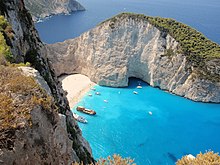
Located in Southern[144] and Southeast Europe,[145] Greece consists of a mountainous, peninsular mainland jutting out into the sea at the southern end of the Balkans, ending at the Peloponnese peninsula (separated from the mainland by the canal of the Isthmus of Corinth) and strategically located at the crossroads of Europe, Asia, and Africa.[d] Due to its highly indented coastline and numerous islands, Greece has the 11th longest coastline in the world with 13,676 km (8,498 mi);[151] its land boundary is 1,160 km (721 mi). The country lies approximately between latitudes 34° and 42° N, and longitudes 19° and 30° E, with the extreme points being:[152]
- North: Ormenio village
- South: Gavdos island
- East: Strongyli (Kastelorizo, Megisti) island
- West: Othonoi island

Eighty percent of Greece consists of mountains or hills, making the country one of the most mountainous in Europe. Mount Olympus, the mythical abode of the Greek Gods, culminates at Mytikas peak 2,918 metres (9,573 ft),[153] the highest in the country. Western Greece contains a number of lakes and wetlands and is dominated by the Pindus mountain range. The Pindus, a continuation of the Dinaric Alps, reaches a maximum elevation of 2,637 m (8,652 ft) at Mt. Smolikas (the second-highest in Greece) and historically has been a significant barrier to east–west travel.
The Pindus range continues through the central Peloponnese, crosses the islands of Kythera and Antikythera and finds its way into southwestern Aegean, in the island of Crete where it eventually ends. The islands of the Aegean are peaks of underwater mountains that once constituted an extension of the mainland. Pindus is characterised by its high, steep peaks, often dissected by numerous canyons and a variety of other karstic landscapes. The spectacular Vikos Gorge, part of the Vikos-Aoos National Park in the Pindus range, is listed by the Guinness book of World Records as the deepest gorge in the world.[154] Another notable formation are the Meteora rock pillars, atop which have been built medieval Greek Orthodox monasteries.[155]
Northeastern Greece features another high-altitude mountain range, the Rhodope range, spreading across the region of East Macedonia and Thrace; this area is covered with vast, thick, ancient forests, including the famous Dadia Forest in the Evros regional unit, in the far northeast of the country.
Extensive plains are primarily located in the regions of Thessaly, Central Macedonia and Thrace. They constitute key economic regions as they are among the few arable places in the country. Rare marine species such as the pinniped seals and the loggerhead sea turtle live in the seas surrounding mainland Greece, while its dense forests are home to the endangered brown bear, the Eurasian lynx, the roe deer and the wild goat.
Islands

Greece features a vast number of islands—between 1,200 and 6,000, depending on the definition,[156] 227 of which are inhabited—and is considered a non-contiguous transcontinental country. Crete is the largest and most populous island; Euboea, separated from the mainland by the 60 m-wide Euripus Strait, is the second largest, followed by Lesbos and Rhodes.
The Greek islands are traditionally grouped into the following clusters: the Argo-Saronic Islands in the Saronic gulf near Athens; the Cyclades, a large but dense collection occupying the central part of the Aegean Sea; the North Aegean islands, a loose grouping off the west coast of Turkey; the Dodecanese, another loose collection in the southeast between Crete and Turkey; the Sporades, a small tight group off the coast of northeast Euboea; and the Ionian Islands, located to the west of the mainland in the Ionian Sea.
Climate
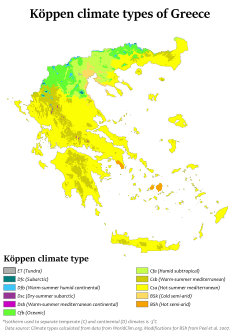
The climate of Greece is primarily Mediterranean (Köppen: Csa),[157] featuring mild to cool, wet winters and hot, dry summers.[158] This climate occurs at most of the coastal locations, including Athens, the Cyclades, the Dodecanese, Crete, the Peloponnese, the Ionian Islands and parts of mainland Greece. The Pindus mountain range strongly affects the climate of the country, as areas to the west of the range are considerably wetter on average (due to greater exposure to south-westerly systems bringing in moisture) than the areas lying to the east of the range (due to a rain shadow effect),[159] resulting to some coastal areas in the south falling to the hot semi-arid climate (Köppen: BSh) category, such as parts of the Athens Riviera and some of the Cyclades, as well as some areas in the north featuring a cold equivalent climate (Köppen: BSk), such as the cities of Thessaloniki and Larissa.
The mountainous areas and the higher elevations of northwestern Greece (parts of Epirus, Central Greece, Thessaly, Western Macedonia) as well as in the mountainous central parts of Peloponnese – including parts of the regional units of Achaea, Arcadia and Laconia – feature an Alpine climate (Köppen: D, E) with heavy snowfalls during the winter. Most of the inland parts of northern Greece, in Central Macedonia, the lower elevations of Western Macedonia and East Macedonia and Thrace feature a humid subtropical climate (Köppen: Cfa) with cold, damp winters and hot, moderately dry summers with occasional thunderstorms. Snowfalls occur every year in the mountains and northern areas, and brief periods of snowy weather are possible even in low-lying southern areas, such as Athens.[160]
Biodiversity
Phytogeographically, Greece belongs to the Boreal Kingdom and is shared between the East Mediterranean province of the Mediterranean Region and the Illyrian province of the Circumboreal Region. According to the World Wide Fund for Nature and the European Environment Agency, the territory of Greece can be subdivided into six ecoregions: the Illyrian deciduous forests, Pindus Mountains mixed forests, Balkan mixed forests, Rhodope montane mixed forests, Aegean and Western Turkey sclerophyllous and mixed forests, and Crete Mediterranean forests.[161] It had a 2018 Forest Landscape Integrity Index mean score of 6.6/10, ranking it 70th globally out of 172 countries.[162] In 2024 Greece became the first country in the European Union to ban bottom trawling in marine protected areas what should protect its marine biodiversity.[163]
Politics


Greece is a unitary parliamentary republic.[164] The current Constitution was drawn up and adopted by the Fifth Revisionary Parliament of the Hellenes and entered into force in 1975 after the fall of the military junta of 1967–1974. It has been revised four times since: in 1986, 2001, 2008 and 2019. The Constitution, which consists of 120 articles, provides for a separation of powers into executive, legislative, and judicial branches, and grants extensive specific guarantees (further reinforced in 2001) of civil liberties and social rights.[165][166] Women's suffrage was guaranteed with an amendment to the 1952 Constitution.
The nominal head of state is the President of the Republic, who is elected by the Parliament for a five-year term.[164] According to the Constitution, executive power is exercised by the President and the Government.[164] However, the Constitutional amendment of 1986 curtailed the President's duties and powers to a significant extent, rendering the position largely ceremonial; most political power is thus vested in the Prime Minister, Greece's head of government.[167] The position is filled by the current leader of the political party that can obtain a vote of confidence by the Parliament. The president of the republic formally appoints the prime minister and, on their recommendation, appoints and dismisses the other members of the Cabinet.[164]
Legislative powers are exercised by a 300-member elective unicameral Parliament.[164] Statutes passed by the Parliament are promulgated by the President of the Republic.[164] Parliamentary elections are held every four years, but the President of the Republic is obliged to dissolve the Parliament earlier on the proposal of the Cabinet, in view of dealing with a national issue of exceptional importance.[164] The President is also obliged to dissolve the Parliament earlier if the opposition manages to pass a motion of no confidence.[164] The voting age is 17.[168]
According to a 2016 report by the OECD, Greeks display a moderate level of civic participation compared to most other developed countries; voter turnout was 64 percent during recent elections, lower than the OECD average of 69 percent.[169]
Political parties
Since the restoration of democracy in 1974–5, the Greek party system was dominated by the liberal-conservative New Democracy (ND) and the social-democratic Panhellenic Socialist Movement (PASOK).[e] PASOK and New Democracy largely alternated in power until the outbreak of the government-debt crisis in 2009, whenceforth they experienced a sharp decline in popularity.[171][172][173][174][175]
In the parliamentary elections of May 2012 the power of the traditional Greek political parties, PASOK and New Democracy, declined from 43% to 13% and from 33% to 18%, respectively, while the left-wing SYRIZA became the second major party with an increase from 4% to 16% and, after new elections in June 2012, New Democracy and PASOK participated in a coalition government.[176]
SYRIZA has since overtaken PASOK as the main party of the centre-left.[177] Alexis Tsipras led SYRIZA to victory in the general election held in January 2015, but, falling short of an outright majority in Parliament,[178] he reached an agreement to form a coalition government with Independent Greeks,[179] a right-wing populist split off party from ND led by Panos Kammenos,[180] with whom SYRIZA formed a coalition for a second time after winning a relative parliamentary majority in the September 2015 general election.[181] However, the July 2019 general election was a landslide for New Democracy and its leader Kyriakos Mitsotakis was sworn as the new Prime Minister of a centre-right government.[182][183] Other parties represented in the Hellenic Parliament are the Communist Party of Greece (KKE), Greek Solution, New Left, Spartans, Victory and Course of Freedom.
Foreign relations

embassy
embassy in another country
general consulate
no representation
Greece
Greece's foreign policy is conducted through the Ministry of Foreign Affairs and its head, the Minister for Foreign Affairs, currently Nikos Dendias. Officially, the main aims of the Ministry are to represent Greece before other states and international organizations;[185] safeguard the interests of the Greek state and of its citizens abroad;[185] promote Greek culture;[185] foster closer relations with the Greek diaspora;[185] and encourage international cooperation.[185] Greece is described as having a special relationship with Cyprus, Italy, France, Armenia, Australia, the State of Israel, the United States and the United Kingdom.[186][187][188][189][190][191]
Following the resolution of the Macedonia naming dispute with the Prespa agreement in 2018, the Ministry identifies two remaining issues of particular importance to the Greek state: Turkish challenges to Greek sovereignty rights in the Aegean Sea and corresponding airspace and the Cyprus dispute involving the Turkish occupation of Northern Cyprus.[192]
There is a long-standing conflict between Turkey and Greece over natural resources in the eastern Mediterranean. Turkey does not recognize a legal continental shelf and exclusive economic zone around the Greek islands.[193]
Additionally, due to its political and geographical proximity to Europe, Asia, the Middle East and Africa, Greece is a country of significant geostrategic importance, which it has leveraged to develop a regional policy to help promote peace and stability in the Balkans, the Mediterranean, and the Middle East.[194] This has accorded the country middle power status in global affairs.[195]
Greece is a member of numerous international organizations, including the Council of Europe, the European Union, the Union for the Mediterranean, the North Atlantic Treaty Organization, the Organisation internationale de la francophonie and the United Nations, of which it is a founding member.
Military
The Hellenic Armed Forces are overseen by the Hellenic National Defense General Staff (Greek: Γενικό Επιτελείο Εθνικής Άμυνας – ΓΕΕΘΑ), with civilian authority vested in the Ministry of National Defence. It consists of three branches:[196]
- Hellenic Army (Ellinikos Stratos, ES)
- Hellenic Navy (Elliniko Polemiko Navtiko, EPN)
- Hellenic Air Force (Elliniki Polemiki Aeroporia, EPA)
Moreover, Greece maintains the Hellenic Coast Guard for law enforcement at sea, search and rescue, and port operations. Though it can support the navy during wartime, it resides under the authority of the Ministry of Shipping.
Greek military personnel total 364,050, of whom 142,700 are active and 221,350 are reserve. Greece ranks 28th in the world in the number of citizens serving in the armed forces. Mandatory military service is generally one year for 19 to 45 year olds.[197] Additionally, Greek males between the ages of 18 and 60 who live in strategically sensitive areas may be required to serve part-time in the National Guard.
As a member of NATO, the Greek military participates in exercises and deployments under the auspices of the alliance, although its involvement in NATO missions is minimal.[198] Greece spends over US$7 billion annually on its military, or 2.3 percent of GDP, the 24th-highest in the world in absolute terms, the seventh-highest on a per capita basis, and the second-highest in NATO after the United States. Moreover, Greece is one of only five NATO countries to meet or surpass the minimum defence spending target of 2 percent of GDP.
Law and justice
The judiciary is independent of the executive and the legislature and comprises three Supreme Courts: the Supreme Civil and Criminal Court of Greece, the Council of State and the Court of Audit. The judicial system is also composed of civil courts, which judge civil and penal cases and administrative courts, which judge disputes between citizens and the Greek administrative authorities.
The Hellenic Police is the national police force. It is a large agency with its responsibilities ranging from road traffic control to counter-terrorism. It was established in 1984 as the result of the fusion of the Hellenic Gendarmerie and the Cities Police forces.[199]
Administrative divisions
Since the Kallikratis Programme reform entered into effect in January 2011, Greece has consisted of 13 regions subdivided into a total of 325, from 2019 332 (Kleisthenis I Programme), municipalities. The 54 old prefectures and prefecture-level administrations have been largely retained as sub-units of the regions. Seven decentralised administrations group one to three regions for administrative purposes on a regional basis. There is one autonomous area, Mount Athos (Greek: Agio Oros, "Holy Mountain"),[200] which borders the region of Central Macedonia.[201]



